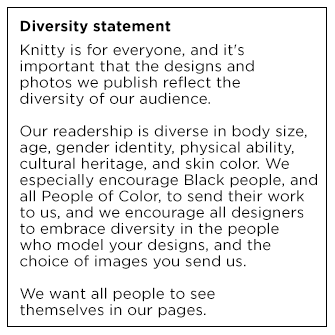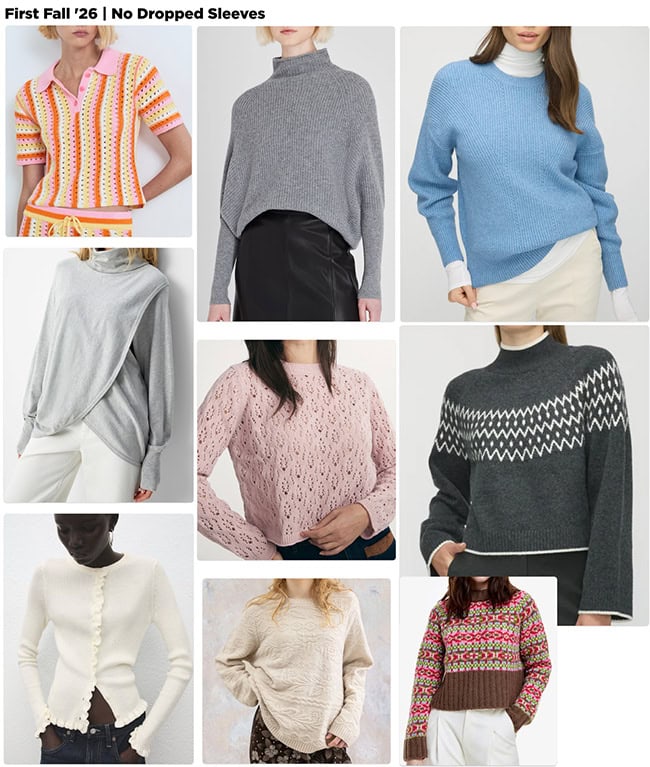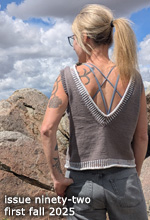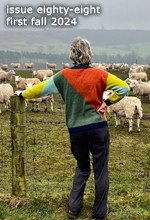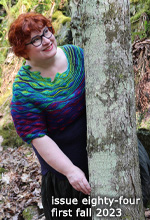Design Or Write For Knitty
Submission Guidelines
Interested in getting your pattern or tutorial published in Knitty?
![]()
Knitty Contributor List
![]()
FAQ for designers and authors
[Last update: December 17, 2025]
NOTE: Please download the latest version of our style guide before preparing your submission.
We are now soliciting patterns for our First Fall 2026 issue which goes live in early June 2026. We accept both knitting and crochet (including Tunisian crochet) designs, and are happy to see designs that incorporate multiple techniques. See the What do you pay for submissions? section below for further details.
Please be sure to download the new Style Guide Template and write your pattern into that document. Your Tech Editor will love you for it. (And make you do it if you didn't in the first place, so...ya know. Please do it.)
|
Remember: we also like weird and surprising things that make you gasp or giggle. To get an idea of what we like to publish for First Fall, some suggestions:
Knitty is about what you want to make right now, with a little twist in the construction or design to make it feel fresh. We prefer saturated semi-solid colors over neutrals, unless a neutral is the perfect thing for your design. We don't usually publish designs featuring novelty yarns like fake fur, pompom, and chenille.
Remember, as you design for Knitty, ask yourself this: what makes your design unique? Tell us about it when you write your e-mail to us. Bullet points are fine. Be clear and succinct.
An important reminder: Knitty is religion neutral,
so nothing related to any religion will be published.Submissions must be new -- not previously shown in any form [even just a picture] in another mag or on any website, including Ravelry or Instagram. Once your work is published in Knitty, you may include a picture on your website with a link to the Knitty website. After the following issue is published [3 months later], you may do whatever you wish with your work, including self publishing or submitting it to other publications. The copyright for your work always remains with you.
Click each section below for more details.
ANYONE can submit a pattern to Knitty, regardless of your level of experience as a designer, age, publication history (or lack thereof), or location.
We have published designers who are still in their early teens, and those in their 70s. We publish the best work that comes into our Submission box, and it doesn't matter whether this is your first design or your 10th. Where you live doesn't matter. What does matter is that your work is solid, that your math makes sense, and that the pattern instructions will produce the design you have created for our readers.
Our Technical Editors are very experienced at helping newer designers understand the process of producing a pattern for publication, figure out how to solve mistakes in math, and improve fit where possible. The Technical Editor will not do the work for you, but will guide you so you learn how to do it yourself.
We are proud to be part of your process of becoming an established knit or crochet designer.
Knitty does not accept design proposals from designers we have not worked with previously.
Instead, a submission to Knitty must consist of a completed design along with the elements we specify in this section. We work this way so that designers of any level of experience can be published, because we have their finished work in hand and can fully evaluate if the pattern works and can be followed by our readers.
We understand and appreciate that this is a lot of work for the designer to complete without a guarantee of publication. However, should you not be accepted into Knitty, you will be able to self-publish or send your work to other publications for consideration.
This complete-submission method is how we have been able to feature so many brand-new designers over the years, without them having to prove their work is good because they have been published in another magazine. We also find that working this way, we get what the designer themselves wants to create, which often reflects what our readers will want to make.
The choice of yarn is entirely up to you.
- Use currently available yarn and colorways when possible
- Please be aware of the total cost of the project as you choose your yarn; we want as many people as possible to be able to knit your design in the original yarn, if they wish to.
- Super luxury yarns are not the best choice unless the project is small.
- If the yarn you use is discontinued by the time your pattern is submitted, please list an alternate that will produce similar results.
We try to facilitate this when possible for established contributors to Knitty (ie we know you and your work). Established contributors may email the editor with your concept, sketches, swatches and yarn requirements as far in advance of the issue your work is planned for as you possibly can. If you have not yet been published in Knitty, we require a full and complete submission to consider your work for publication.
No. Knitty doesn't require or recommend you have your pattern tech edited before you submit it to us. We have a team of skilled, dedicated tech editors who will do that for you, making sure the pattern works and matches Knitty's style sheet and conventions. We do expect you've done your best to make sure your pattern is knittable, and your math and grading (if applicable) is as good as you can make it.
Knitty does not have patterns test knit. If you wish to go through that process before submitting your pattern to Knitty, that's up to you. Having a pattern test knit does not necessarily influence our decision when choosing what patterns to publish. But it may be extra assurance for you that your pattern works as you intended.
Absolutely not. Knitty does not use AI in any form, and will not publish anything created or edited by AI. This includes your images, your pattern text, or your pattern introduction. When you submit your work, you will need to confirm that you have not used AI to create your work. We thank you in advance for your cooperation.
The honorarium ranges from $200-300USD per published submission, thanks to the support of our Knitty Guild. More complex designs, such as sweaters, or uniquely constructed garments like super-creatively built socks, will merit the top end of the scale. Payment will be by Paypal and contributors can expect payment by the time the issue's surprise goes live -- midway between your issue and the next.
In addition to the honorarium, we offer you a highly visible, professional place to show your work to a large, well-connected audience, plus a link back to the website(s) of your choice. Our designers and authors can enjoy significant traffic as a result of their Knitty exposure, and often see a spike in their pattern sales as a result. If you've dreamed of becoming a professional published knitwear designer or writer, Knitty could help you get there. It's also a great way to build an audience and generate sales for your own pattern line or other knitting-related product.
You [the creator of the work] will retain all copyrights to your own work. By submitting work to be published in Knitty and accepting the honorarium, you are giving your permission for your pattern or article and all related images to be included in Knitty magazine in its current format and other electronic or computer-readable distribution formats. Back issues of Knitty [our Library] will remain available online indefinitely.
Once the current issue that showcases your pattern or article has moved to the Library [our archives], you are free to do as you wish with the pattern or article, which includes submitting it elsewhere or self publishing.
Consideration for each issue's designs begins after the submission deadline has closed, and it can take between 2 weeks to 2.5 months after the deadline to receive a final decision on your work.
Once the submission deadline has passed and all potential designs are in hand, we begin the selection process. We endeavor to let every designer know if they will be included in the next issue as soon as possible. If you have not heard from us by two weeks before publication, please write the editor and inquire.
Patterns not given an initial YES or NO response are being evaluated for possible publication in a future issue. Should we wish to hold your pattern for a future issue, we will write and ask for your permission to do so.
Thank you for asking, but no. If your design might work for Knitty, but just not in the upcoming issue, the editor will ask your permission to hold their design for consideration for a future issue. If the editor thinks your design would work with modifications, she will contact you to discuss this.
Our editors choose what they like and/or what they think Knitty readers will like. The quality of the knitted item, written pattern AND the images that accompany the submission are very important.
No payment is or has ever been accepted by Knitty in exchange for publishing a design. If it's in our pages, it's there because we think people will enjoy knitting it or be inspired by it.
Please take careful note of our deadlines below, and check this page every time you're starting to prepare a submission. We don't want you to lose out because a deadline changed and you missed it!
| Issue | Theme | Deadline | Issue live | First Fall + Holiday Headstart 2026 |
No dropped sleeves: Transitional season wear, featuring layers for differing temperatures, and small gift projects to knit well ahead of gift season at the end of the year. |
Mar 15, 2026 | June 2026 |
| Deep Fall 2026 | THEME TBD: Super-cozy cool-weather garments + accessories |
June 15, 2026 | Sep 2025 |
| Winter 2026 | Scraptastic '26: Cold-weather garments + accessories, quick last-minute gift knits |
Sep 15, 2026 | Dec 2026 |
| Spring+Summer 2027 | TBD |
Dec 1, 2027 | Mar 2027 |
Payment to all contributors happens around the time that the issue's Surprise goes live -- midway between your issue and the next.
Yes. If you've been contacted about having your pattern translated into Danish (most frequent) or any other language, it's up to you to give your permission or not. We're happy to have Knitty patterns translated into other languages with the permission of the designer. Remember, you retain the copyright to your work, so as long as you're okay with it, it's fine with us. We ask that the translation include a note that you have given your permission for the translation, and a link back to the original English version on Knitty.
![]()
Please read and follow all instructions precisely.
Knitty Patterns
All design submissions for our First Fall 2026 issue must be received by March 15, 2026. If you are close to having a pattern ready on that date, but need more time, please write the Editor and provide details.
Your submission must include the following, sent as individual files (not one PDF or Word doc that has the pattern text and images in it) using our online submission form:
Click each section for more details.
A complete written knitting or crochet pattern that adheres to the Knitty style guide in a Word or text-only document without images; do not send PDFs. Download this template in RTF format and follow the conventions carefully when creating your submission
- IMPORTANT: Take some time to read patterns we've published and follow our conventions. A table of Knitty's standard abbreviations can be found here. List any unusual abbreviations and their definitions at the beginning of your pattern in the Pattern Notes section.
- Garment patterns must be sized from XS to 5X for women's designs and S to 5X for men's. Knitty requires all patterns to follow CYC sizing standards. Please do not create your own size increments. These standards need to be applied to every pattern submission, and if your pattern doesn't match these numbers, we'll ask you to revise it in order to be able to publish it. This page will help you with sizing standards and information about grading a pattern to different sizes. Ysolda has created a brilliant chart that we highly recommend. Please pay particular attention to fit as you grade the sizes upwards, and note any possible pattern adjustment recommendations such as bust darts in the Pattern Notes section. Patterns must be graded to the requested size range by the designer before submission to Knitty.
- For shawl/wrap patterns, we prefer designs that can fit a variety of bodies. Shawls that have a more generous wingspan, or can be worked to the knitter's desired width are ideal.
- For sock patterns, this table is a helpful reference:
• for adults, please create 3 to 5 sizes, to fit feet between 8 and 11 inches in circumference.
• for adult women, 3 sizes to fit feet between 8 and 10.5 inches in circumference
• for adult men, 3 sizes to fit feet between 9 and 11 inches in circumference - For hat patterns, this chart, created by Woolly Wormhead, provides standard measurements. Please provide hat patterns for adults in at least 3 sizes.
- Measurements should be provided in both Imperial (inches) and Metric (millimeters/centimeters).
- Please use current, commercially available yarns whenever possible. "Commercially available" means, at minimum, that the yarn can be ordered from a website, all over the world, without difficulty. If the yarn you have used is discontinued by the time your pattern is submitted, please list an alternate that will produce similar results.
- Your work will be edited to match Knitty style.
Designers photograph their own submissions for Knitty (or arrange to have them photographed by someone – a friend or a professional photographer, if that's your choice). In that way, the photos will represent your unique vision for your pattern, and the sample never leaves your possession.
Upload each photo as an individual file. Do not include photos in your pattern document. Knitty's editor will retouch, resize and crop photos as necessary.
- Knitty does not use AI and will not publish anything created by AI.
- A selection of clean and crisp digital images [JPG, best possible quality] of the finished project at 300dpi, at least 1500 pixels wide. Please include as many photos as you can: pretty shots for atmosphere, and a variety of clear detail shots showing the piece from all sides. Do keep your original, unedited photos. If chosen, the editor may request more photos, or larger versions of the ones you've submitted.
- Please ensure that all relevant design features are visible in the photos you send, since this often helps people follow patterns.
- The style and quality of your photos is very important, so show your work to its best advantage! Take lots of different shots from a variety of angles and have fun with the poses! Non-traditional poses and photos that feel natural are what we love best.
- Photos must be well-lit and in crisp focus.
- Please do not include any other knitted or crocheted garments in your photos; just show the one(s) that you are submitting for publication.
- Want a chance to be on the cover? Shoot some great images in landscape (wide) format.
- Are you a designer that's new to Knitty? [as in we haven't published your work before]: It's absolutely essential that your submission photos be clear, in focus, bright, and of the style that we request above. The quality of the photos is an essential component of everyone's submission. In order to evaluate each submission properly, every submission MUST contain photos that are good enough to publish. As always, if you are unable to provide images that meet all our guidelines by deadline, but will provide them soon after, let us know in your submission notes and we can likely work something out. We know that taking great images can be a challenge for some, and if your design is fabulous, we can help you get there with a little coaching after deadline.
Photography tips: Knitty's readership is worldwide and diverse, encompassing people of every possible age, size, color, physical abililty level, and gender. We encourage you to choose a model (yourself or someone you know) who reflects your perspective on the world. A wide range of diversity in our models is important to us, and we welcome the opportunity to reflect the reality of the world around us in this way.
|
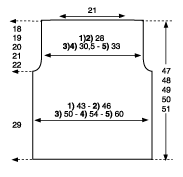 Garment patterns require a schematic of the shape of the garment [see example at right] that shows all relevant measurements in Imperial and Metric. If your pattern covers multiple sizes, please indicate their measurements as well.
Garment patterns require a schematic of the shape of the garment [see example at right] that shows all relevant measurements in Imperial and Metric. If your pattern covers multiple sizes, please indicate their measurements as well.
- Unless they are a very unusual shape, other items do not require a schematic.
- The schematic should be provided as a GIF, PNG or EPS file. Clean, hand-drawn sketches are acceptable.
If your pattern requires a chart or charts, send them as individual files.
- Knitty uses Stitch Mastery software exclusively to prepare all our charts. If you use this software, please submit both .knt2 and .jpg files for charts. The Tech Editors will thank you.
- If you cannot use/don't haveStitch Mastery, please refer to the Spreadsheet portion of this article for instructions on a simple way to chart with free software (or Excel or Numbers, should you have either of those).
A signed, dated statement that the pattern you are submitting is your own original work. Please copy the following text, sign below and include it with your submission:
By submitting a design to be published in Knitty, I verify that I am the original creator of the work, and that I have not infringed and/or violated the existing intellectual property rights of any third person in the creation of the work I claim as mine. Further, I agree to hold Knitty and its editors and publisher harmless from any and all expenses, losses, liabilities, damages or third-party claims that may arise from any infringement and/or violation of such intellectual property rights. The one-time fee paid by Knitty is my full compensation for all electronic and/or computer-readable media distribution rights. This notice will serve as my written permission to allow my pattern and all related images to be published in Knitty magazine in its current format and in any future format in perpetuity.
To send us your pattern, use our direct submission method using our simple online form.
If you are unable to use the form, you may send the submission by email to the Editor. Kindly title your e-mail: "Knitty First Fall 2026 pattern sub: *yourpatternnamehere*"
![]()
Tutorials
[see below for additional Knittyspin article guidelines]
Tutorials of unique techniques, or techniques that have not yet been covered by other articles in our archive are most welcome. Tutorials require clean, detailed photography and clear step-by-step instructions. Do you have a unique skill related to knitting or crochet? Share what you know!
Tutorials for our First Fall 2026 issue must be received by March 15, 2026.
Your submission must include the following, sent as individual files using our online submission form:
Click each section below for more details.
Tutorials should be between 1000–3000 words. Introduce the technique(s) you are going to talk about in a paragraph or so, then use clear wording as you describe each step of the process.
- Compose the tutorial in either Word or a rich text file. Do not send PDFs.
- Note the filename of each image in the location you feel it belongs in the document (ie IMG1234.jpg).
- Do not include images in the tutorial document.
- Include URLs of supporting techniques or video demonstrations in the appropriate location in the document.
- Your work will be edited for length and format, in order to match Knitty style.
Supporting graphics or photography are essential. As an example, see this article.
- Knitty does not use AI and will not publish images created by AI.
- Images must be clean, crisp, and well-lit.
- A solid white background is usually best (choose a contrasting yarn/fiber that will show up well against the white).
- Format: JPG, best possible quality, 300dpi, at least 1500 pixels wide. Please include as many photos as you can. We will crop and retouch as needed. As with patterns, photo quality is very important.
A txt, RTF or Word document with the following information:
- your name as you wish it to be published
- an e-mail address where readers can send questions or feedback
- your Paypal e-mail address, so we can pay you
- the URL to your website or blog, if you wish us to link to you
- a short bio [100 words max], written in 3rd person
- a headshot of you
- the name of any models featured in photographs you submit
- the photographer's name
A signed, dated statement that the tutorial you are submitting is your own original work. Please copy the following text, sign below and include it with your submission:
By submitting a tutorial to be published in Knitty, I verify that I am the original creator of the work, and that I have not infringed and/or violated the existing intellectual property rights of any third person in the creation of the work I claim as mine. Further, I agree to hold Knitty and its editors and publisher harmless from any and all expenses, losses, liabilities, damages or third-party claims that may arise from any infringement and/or violation of such intellectual property rights. The one-time fee paid by Knitty is my full compensation for all electronic and/or computer-readable media distribution rights. This notice will serve as my written permission to allow my article and all related images to be published in Knitty magazine in its current format and in any future format in perpetuity.
To send us your tutorial, use our direct submission method with our simple online form.
If you are unable to use the form, you may send the submission by email to the Editor. Kindly title your e-mail: "Knitty First Fall 2026 issue tutorial sub: *yourarticlenamehere*"








